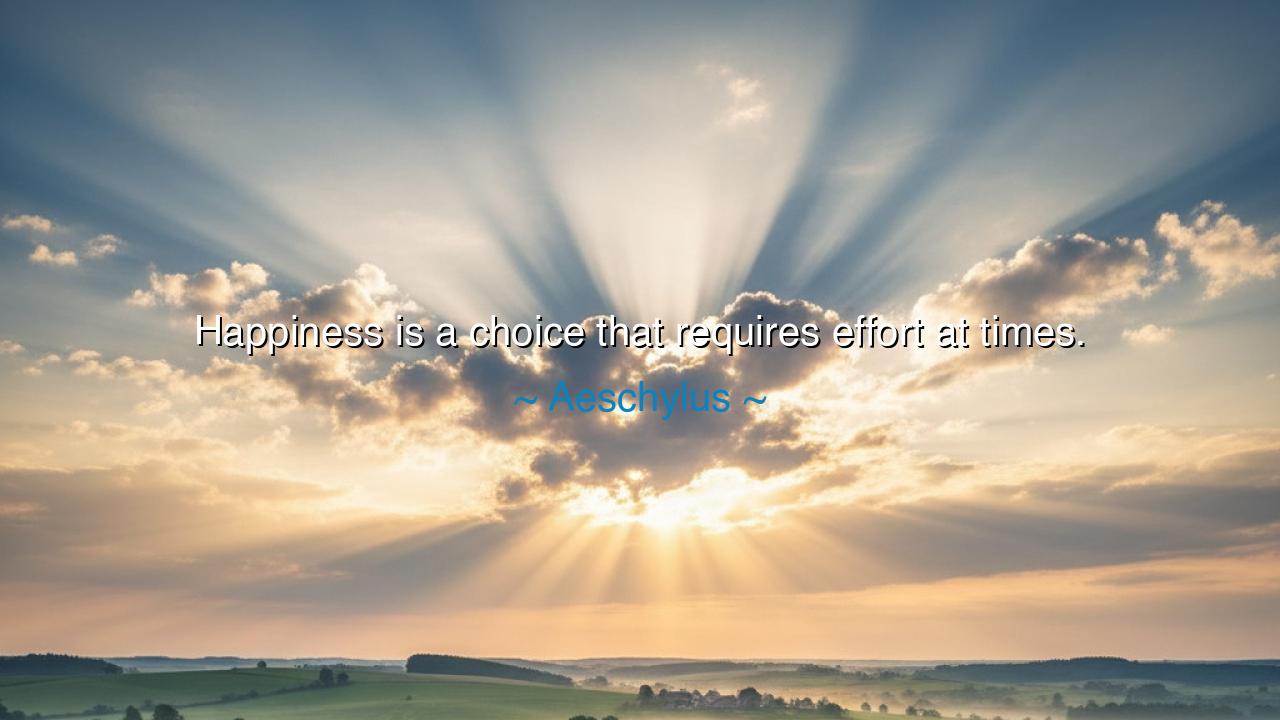
Happiness is a choice that requires effort at times.






“Happiness is a choice that requires effort at times.” — Thus spoke Aeschylus, the father of Greek tragedy, who understood the paradox of human existence better than most. His words, though born in the ancient world, shine with eternal relevance. They remind us that happiness, though often imagined as a gift of fate or fortune, is in truth an act of the will — a discipline of the soul. It is not a constant state bestowed by the gods, but a deliberate turning of the heart toward light, even while the world is shrouded in darkness.
Aeschylus lived in an age of war, loss, and divine uncertainty. He had seen the fires of battle at Marathon and Salamis, and the fragility of mortal life weighed heavy upon him. Yet from this crucible of pain arose his belief that human beings could choose their inner condition. The origin of this quote lies in that recognition: that joy does not come from what happens to us, but from what we do with what happens. The ancients called this eudaimonia — not the fleeting pleasure of the senses, but the quiet harmony of a soul in tune with itself. For Aeschylus, happiness was not the absence of suffering, but the strength to stand upright within it.
When he says that happiness “requires effort,” he speaks to the truth that the heart, like a muscle, must be trained to endure. There are times when life rises against us — when the gods seem silent and the road is long — and in those moments, happiness must be worked for as one works for peace. It is an art, not an accident. The one who waits for the perfect season to be content will never know contentment, for every season carries its storm. The wise, therefore, learn to build their joy not from circumstance, but from within, shaping it as a sculptor shapes marble — patiently, purposefully, day after day.
Consider the story of Viktor Frankl, a man who lived through the horrors of the Nazi concentration camps centuries after Aeschylus wrote his lines. Stripped of freedom, family, and dignity, Frankl discovered one freedom that could never be taken — the freedom to choose one’s attitude. Amid unspeakable suffering, he found meaning in helping others survive, in refusing to surrender his humanity. He chose, in the darkest place, to affirm life. That choice, born of effort, became his happiness. In this, he lived out the truth of Aeschylus’s ancient wisdom: that the will to be joyful in despair is the highest act of courage.
For happiness, rightly understood, is not a shallow smile nor the denial of pain. It is a quiet courage — the soul’s defiance of despair. It is found not in comfort, but in acceptance; not in endless pleasure, but in purposeful striving. The Greeks knew this well: that the gods favor those who, even in grief, lift their eyes to the dawn. The one who makes an effort to find beauty amid ashes becomes stronger than fate itself. And in this strength, happiness is not a fragile dream — it becomes a fortress, a fire that endures every wind.
The lesson is clear, my child of tomorrow: do not wait for happiness to come to you as a guest, for it will not. Invite it, labor for it, protect it as you would a sacred flame. When sorrow comes — and it will — tend to your heart with patience. When bitterness tempts you, answer with gratitude. When despair whispers, “There is no joy left,” reply, “Then I will make it myself.” This is the labor Aeschylus speaks of — the divine labor of the spirit that transforms suffering into serenity.
So remember: happiness is a choice, but it is not an easy one. It is forged in the same fire that forges wisdom. It asks you to rise each day and say yes to life — not because life is perfect, but because it is precious. And if, at times, it requires effort, let that effort be your offering to the gods. For in the act of choosing joy, even when it costs you strength, you become not a slave of fate but a co-creator of your destiny. Thus, in the struggle itself, happiness is found — radiant, resilient, and wholly your own.






AAdministratorAdministrator
Welcome, honored guests. Please leave a comment, we will respond soon